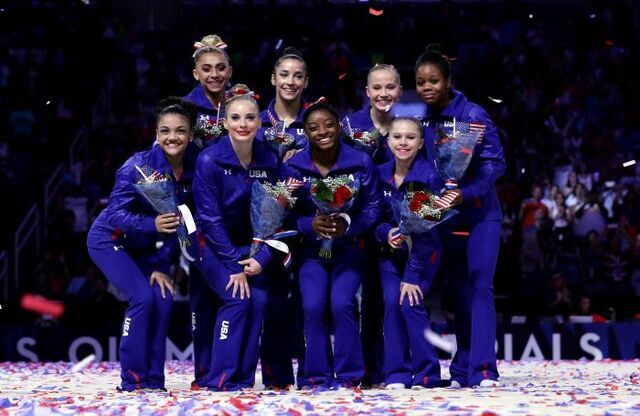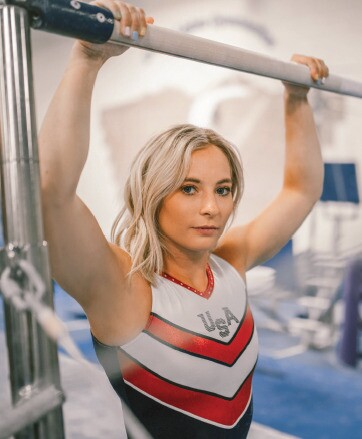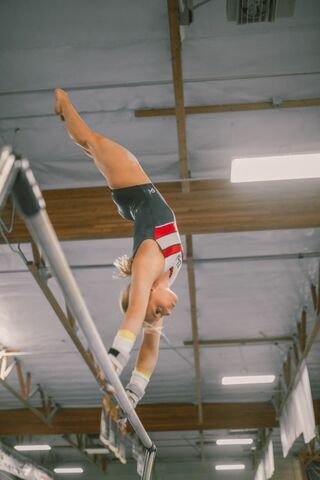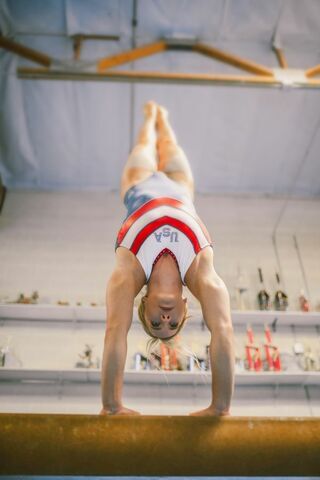On November 14, 2019, MyKayla Skinner Harmer achieved a goal she has dreamed of since she was a little girl sitting in Primary. It was a goal she has worked toward her entire life. Readers may recognize MyKayla’s name because of gymnastics, but this goal had nothing to do with the Olympic sport, and it wasn’t achieved in a gym. It was the day she walked through the doors of the Gilbert Arizona Temple and was married for time and all eternity.

“I’ve looked up to all of my siblings [and have seen them] get married in the temple and have kids, so that’s just something that I’ve always wanted,” she says.
Her husband, Jonas Harmer, adds, “It was always a goal of hers to get married in the temple, and it was always a goal of mine. Finally when it was the right time and it happened, it was just a great moment: a lot of things coming together. It meant a lot to us.”
While she has achieved goals in gymnastics, she calls going to the temple to receive her endowment “the greatest experience.”
But there’s another dream that MyKayla has worked toward for a long time that she has yet to check off her bucket list: competing in the Olympic Games.
The Alternate
On July 10, 2016, 20-year-old MyKayla sat in a room in the SAP Center—an arena in San Jose, California—where she had just finished fourth all-around in the USA Olympic Gymnastics Trials. While she awaited the news of who would be on the Olympic team, she texted her sister.
MyKayla wanted to know if her sister thought she would make the team, which would include five gymnasts. Families of gymnasts know how the sport works—and the Skinner family has watched a lot of gymnastics over the years. MyKayla’s performance should have been enough to secure a spot on the team that would come to be known as the “Final Five,” but her sister knew there is often more to these decisions than meets the eye. So, while MyKayla had done her part to make the team, her sister said they would just have to wait and see. Meanwhile, many of MyKayla’s family members were at home and had already seen most of the other front-runners and their families be interviewed on television. As they watched, it seemed to her family like the team had already been selected. Deep down they all, MyKayla included, had a hunch she wouldn’t make the team.
“I kind of had the feeling like I knew they weren’t going to pick me, but then you still have that hope,” she says.
And yet, when Marta Karolyi, the national team coordinator, and her staff came in with their decision, MyKayla listened as five names were read—none of them hers.

She felt void of emotion until her name was read as one of three alternates, and that’s when the tears started to come. They weren’t happy tears. MyKayla knew what it was like to be an alternate, having already been one for the 2015 USA World Championships team, and she had worked hard to avoid repeating the experience.
“They say, ‘Even if you’re an alternate, you’re still an Olympian,’” MyKayla says. “But I never feel like I ever actually accomplished that goal.”
A Higher Purpose
MyKayla ultimately convinced herself that, alternate or not, the Olympics were likely a once-in-a-lifetime experience. She would go to Rio de Janeiro and make the most of it. After all, MyKayla has always felt that her participation in gymnastics has a higher purpose.
“I’ve kind of always wanted to go on a mission, but obviously with the whole gymnastics thing it never really played out for me,” MyKayla says. “But in my patriarchal blessing it talks about how this is my mission to the youth. My whole patriarchal blessing talks about gymnastics, which is really, really cool.”
Being an elite gymnast since she was a young teenager has often meant traveling to foreign countries where the drinking age is 16 or 18, so MyKayla learned early on to be clear about what she would and would not do. Eventually, her teammates caught on.
She recalls being at a World Championships banquet with Simone Biles when a male gymnast asked a bartender, “Can we get three shots?”

“He went to hand me the drink and Simone was like, ‘You can’t give her that! She doesn’t drink alcohol. Do not give her that!’” MyKayla recalls, expressing gratitude for friends who have supported her in living her standards.
She has also remained committed to not practicing on Sundays if at all possible.
“It’s nice being able to have my Sundays off when I can, and to go to church and spend time with my family, and it’s good for my body to take that time off,” she says.
But even with her strong sense of purpose, gymnastics has not always been a positive experience for MyKayla.
USA Gymnastics
Known for her honesty and transparency, MyKayla has always been open about her experience with elite gymnastics. She remembers being placed on diets that were so extreme that Larry Nassar, who was then the USA Gymnastics team doctor, always snuck the gymnasts treats. Prior to the 2016 Olympics, she was expected to train seven hours a day with Marta Karolyi, who at the time was the national team coordinator and someone MyKayla describes as “brutal”—someone she genuinely feared. Every three weeks she was expected to attend training camp; she says she still suffers from anxiety surrounding those experiences.
So when reports of the corruption surrounding USA Gymnastics broke out soon after the 2016 Olympics, they didn’t all come as a shock to MyKayla, who saw much of it in living color. But what she didn’t see or experience was Nassar’s abuse of many young gymnasts, so she was shocked when the news surrounding the team doctor broke.
“I was right there, and I didn’t know any of that?” MyKayla remembers wondering. “And then I started thinking, ‘How did I walk out of that?’”
MyKayla hasn’t watched the documentary Athlete A on Netflix, which details Nassar’s abuse. He was ultimately sentenced to serve at least 100 years in prison after being found guilty of various sexual abuse crimes against young gymnasts. As viewers watch the documentary, they likely wonder how MyKayla escaped the abuse when it is clear she attended the same training camps and can frequently be spotted in the competition footage. In retrospect, she can see that caution by her coach, Lisa Spini, likely kept her safe. She recalls Nassar taking her into a back room with curtains closed for treatment and Spini being sure to come with her.
“I stayed next to her at the table,” Spini told AZCentral. “Nothing inappropriate happened. It wasn’t that I suspected anything. I like to make sure my athlete is being taken care of appropriately, so that’s what I did. I don’t think she was ever left alone with [Nassar]. Lucky for us. Maybe that’s why she was spared.”
The University of Utah
When the dust settled around her experience in Rio, MyKayla faced a big decision.
“I was praying and trying to decide, ‘Okay, do I continue to do elite gymnastics, go pro, train for the next Olympics, get these next four years going, or do I go to college [and] try this route out?’” MyKayla recalls.
Her patriarchal blessing talks about going to college, and that played a big role in her decision to walk away from the elite gymnastics world to compete as a collegiate gymnast at the University of Utah.
She calls her time as a Ute “the best three years ever.” Finishing with two NCAA championships (floor exercise champion in 2017 and vault champion in 2018) and two NCAA all-around runner-up finishes, MyKayla says college gymnastics is “a different kind of hard.”

While an elite uneven bar routine has 12 or 13 skills, a college bar routine only includes two to three. Rather than a focus on big showstopping skills, college is all about perfection. In elite gymnastics, a perfect 10 is a thing of the past. But in college, it is still a very real possibility—MyKayla received three perfect 10s during her NCAA gymnastics career.
At the conclusion of her junior season, part of MyKayla wanted to settle down permanently in Utah, finish school, start a family with her new husband, and move on with life. She was proud of what she had accomplished and a huge part of her was ready to move on, but she also knew she had unfinished business.
“You want to do college gymnastics and get that college scholarship, but for me, before college, it was the Olympics,” she says.
One More Try
At times, MyKayla wonders why she feels so compelled to keep reaching for her goal, and some days she wants to quit. Since she was 5 years old, she has done the same thing nearly every day—gym, trainer, gym, physical therapy, gym, trainer—over and over again. Every day, she has woken up with the pressure of working on new skills. The reality is that most gymnasts have a love-hate relationship with the sport, and MyKayla says that is certainly the case with her feelings. As her husband, Jonas, puts it, “No gymnast on their time off is like, ‘Oh, let’s go do some gymnastics.’”
Gymnastics is not only physically exhausting but mentally exhausting, which led MyKayla to Clay Frost, a mental training expert who is also a member of The Church of Jesus Christ of Latter-day Saints.
“Gymnastics is a terrifying sport,” Frost explains. “The beam is very small. You make a little mistake and you legit could [experience] bodily injury.”

In some ways, MyKayla’s age as a 24-year-old gymnast presents some unique challenges. She trains less than she used to. Developing new skills that will make her routines more competitive feels scarier than it used to, but she has found that being an “older” gymnast brings some pros along with the cons.
“The older you are, the better you know yourself. Watching me and Simone, you don’t see a lot of gymnasts, especially here in the US, [at] the age we are. And we’re only 23 and 24,” she says. “If gymnasts could last longer and be older, you just know your body and how it works so much better.”
She remembers when former Team USA gymnasts Aly Raisman and Gabby Douglas decided to make a run for a second Olympic appearance in the 2016 games.
“Simone and I would sit there and be like, ‘If we made the Olympic team, that’s enough to accomplish. . . . There’s no way we would [try for a second Olympic appearance]. Not a chance,’” she recalls with a laugh, now that both she and Simone are vying for one more shot at Olympic glory. MyKayla emphasizes that things are dramatically better for elite gymnasts now that they’re under new leadership, and she even calls gymnastics “fun” again.
“I just feel like it was meant to be that I was . . . an alternate,” MyKayla says. “Because I think I was supposed to come back and try for . . . the Olympics [again], and maybe have a better experience with it because I feel like my last experience was just so miserable. I hated gymnastics: I hated everything about it. So with this comeback, it’s just been so much more fun, and Simone and I have had a much better time.”
The pair of veteran gymnasts received a lot of attention last March when the pandemic hit. All of a sudden, instead of just four more months of training before the Olympic Games in Tokyo, they were faced with the decision of whether or not to train for an additional year as the games were postponed—would their bodies even hold up? The answer remains to be seen, as the Olympic Team Trials will be held at the end of June, but in the last year, MyKayla has battled an Achilles injury and contracted COVID-19, which turned into pneumonia and required hospitalization. Still, it is the goal that keeps her going. She says not having yet achieved that goal has only increased her fight and her determination.
“I think that’s kind of why we go through trials,” she says, “so that it makes us stronger, [and] so that when you have another trial here or there, you know how to deal with it better or you can help others.”
After working with MyKayla from a mental skills standpoint, Frost has a lot of confidence in MyKayla’s ability to make the Olympic team. He believes her maturity and life experiences have the potential to bring a lot to the table.
“She definitely has a completely different situation than any other gymnast [and] it provides her [with] a lot of stability,” Frost says. “And of course that comes from the covenants in the temple that she’s made with her husband, and a lot of different things that come from being a member of the Church.”
Frost recalls the moment he realized how much he believed in MyKayla’s ability to accomplish her goal. They had recorded a video for MyKayla’s YouTube channel, where she shares her journey with over 60,000 subscribers, and he found himself feeling angry at some viewers who were being critical of her chances of making the Olympic team.
“I see the work she puts in and how smart she is, and how she’s approaching it,” Frost says. “I’m just so excited for her to be able to put together a great performance at the Olympic trials and get that spot.”
Some days, MyKayla asks herself why she is still here, saying that every day in the gym she wants to cry because the pressure is so great and the training is so intense. The dream is all-consuming—she thinks of it even as she is falling asleep at night. But if she made it?
“If I just got to be up on that podium with my hand on my heart, [that] would be so unreal. . . . I just have worked so hard, and to know that the hard work finally paid off would be the best feeling in the world. And to be like, ‘Yeah, I was an alternate three times, but I kept pushing through even when it got tough—and look where it got me. Look where I am today,’” she says, clearly describing a scene she has visualized many times. “I really hope that I can accomplish that goal and finish my story.”


